Ranking All 40 of Steven Moffat’s Doctor Who Stories – Part 1: #40 - #31
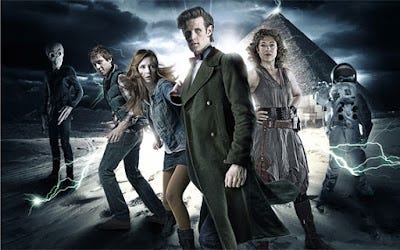
On April 3rd, 2010, a new era of Doctor Who began. Steven Moffat was our new head writer and showrunner, Matt Smith was our new Doctor, and we were off to the races with “The Eleventh Hour,” an episode that announced with confidence that the show was in good hands. That’s the first episode of Doctor Who I ever watched live, and I’ve been following this era closely ever since, covering nearly every episode of these past eight years in written or podcast form. And this week, that era came to an end with “Twice Upon a Time,” the Christmas Special that saw Moffat, Peter Capaldi, and a whole host of other creatives from the era take a bow, handing the reigns off to Chris Chibnall and Jodie Whittaker for the show’s next, exciting step forward.
But with any change comes a chance for reflection, which is what I am doing here. The Steven Moffat era of Doctor Who was a truly special and singular one, in part because Moffat is a special and singular writer, one of the most significant voices ever to contribute to this remarkable creative institution. So now that his final episode is out in the world, I am counting down all 40 – count ‘em, forty – Doctor Who stories Moffat has contributed, as writer or, in a few rare cases, co-writer, from 2005’s “The Empty Child” to this week’s “Twice Upon a Time.” I watched every single one of these again, took extensive notes, and ranked them from least-favorite to most-favorite. These rankings are, of course, only an expression of my own taste and preferences; wherever yours may differ, I hope we can, at least, all agree that the sheer number of amazing TV episodes contained on this list is rather mind-boggling.
This series is also a walk down memory lane, as I have included links to my original written reviews and/or the original Weekly Stuff Podcast reviews to every episode (save some of Moffat’s earliest Russell T Davies-era stories, for which the podcast and my site did not yet exist). In some of these original reviews, you will see that my thoughts are either markedly more positive or negative than they are now, which is part of the fun of this project – I’ve been living with, writing about, talking about, and reconsidering these episodes for years now, some for nearly a decade, and trying to put a punctuation note on that progression (for now) is part of what attracted me to this project.
This list will be published in four parts, once a day through the end of the week, with each part containing 10 episodes. We will begin at the bottom, with #40, and climb our way to the peak at #1 over the next four days. I hope you enjoy, and if you would like to listen to these rankings in Podcast form, we did a whole episode for that.
So without further ado, let us begin with Part 1 - #40 - #31, coming up after the jump…
40. The Wedding of River Song
Original Written Review / Original Podcast Review
Eleventh Doctor, Series 6; Directed by Jeremy Webb
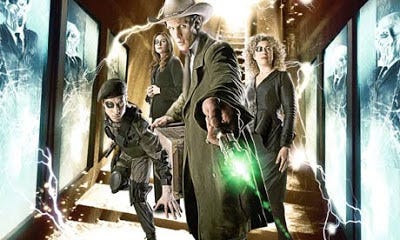
“Doctor WHO!!? Doctor WHO!!!!? DOC. TOR. WHO!!!!!????”
First, a compliment: The scene honoring the late Nicholas Courtney and his immortal creation Brigadier Lethbridge-Stewart is perfect and beautiful and makes me cry every time. So there’s that. Otherwise, “The Wedding of River Song” is an utterly incoherent mess of a script that not only has no clear sense of identity, but changes its identity many times over the course of the hour. It’s a riff on Raiders of the Lost Ark, a ball of terrible timey-wimey nonsense, and an Egypt-set adventure with Pyramids; it has something akin to a central monster with the Silence, but barely remembers to use them; it’s a political revolution story with Amy and Rory leading a resistance; and it is yet another Eleven-era story where Amy and Rory forget about each other and have to rediscover their love. One almost senses that the episode’s attention-deficit nature is a mad attempt to cover up for the fact that Moffat had no clear, satisfactory ideas for how to resolve the many loose threads of Series 6, none of which make any sort of sense when supposedly ‘resolved’ here. Why does River have to be an Astronaut to kill the Doctor? Why does River have to kill the Doctor at all if it’s just a special weapon in the suit that does it? If it weren’t for timey-wimey anti-logic, how would the Silence have ever lured the Doctor to the lake and killed him? The episode is every one of Steven Moffat’s worst instincts indulged in full, the nadir of his tenure on the show. Thankfully, it would all turn around sooner than later, and Moffat’s best days were ahead of him – though we still had a few more murky plot threads to work through in Series 7 before the true renaissance would arrive.
39. The Doctor, the Widow and the Wardrobe
Eleventh Doctor, 2011 Christmas Special; Directed by Farren Blackburn
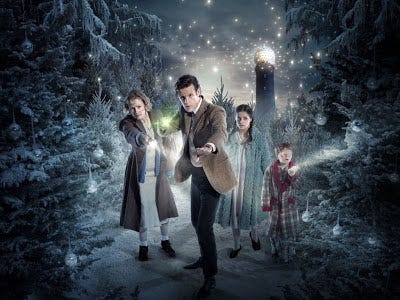
“Because every time you see them happy you remember how sad they’re going to be. And it breaks your heart. Because what’s the point in them being happy now if they’re going to be sad later? The answer is, of course: because they are going to be sad later.”
The first fifteen minutes or so of this one are a good deal of fun, as a companion-less Matt Smith encounters the eponymous widow (Claire Skinner) and comes back the following Christmas to help give her and her children a fun holiday (the speech quoted above is one of Smith’s best moments on the show). But save a poignant final scene in which the Doctor reunites with Amy and Rory, the rest of the episode is so bland, forgettable, and unnecessarily elongated that, even looking over my notes, I struggle to remember much about it. A more than solid idea for an episode, but the script simply doesn’t come together once the story gets underway, and if it isn’t quite Moffat’s worst hour, it certainly feels like his least essential.
38. The Name of the Doctor
Eleventh Doctor, Series 7; Directed by Saul Metzstein
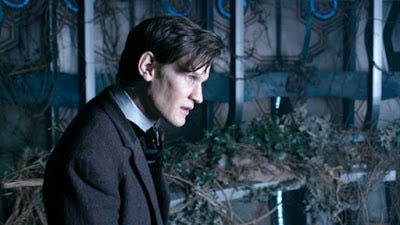
“What I did, I did without choice … in the name of peace and sanity.”
“But not in the name of the Doctor!”
The culmination of several very bad story arcs – Clara’s ill-defined role as the “Impossible Girl,” the mystery of the Doctor’s name, the identity of the mysterious Trenzalore, etc. – “The Name of the Doctor” is actually a bit better than it probably had any right to be – Matt Smith is terrific, the direction and production design is top notch, Murray Gold turns in a haunting score, and the reveal of the War Doctor is excellent – but there is so little substance to the underlying story that it fails to make much of an impression. In the end, it works better as a necessary bit of throat-clearing before the pyrotechnics of “The Day of the Doctor” and the emotional resolution of “The Time of the Doctor” than it does as its own standalone story.
37. The Impossible Astronaut /
Day of the Moon
Eleventh Doctor, Series 6; Directed by Toby Haynes
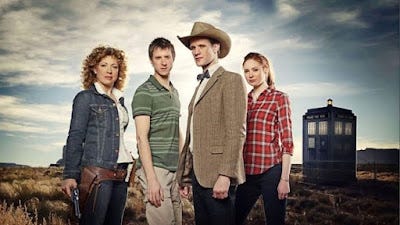
“I wear a Stetson now. Stetson’s are cool.”
While the first hour includes a good deal of very fun showmanship – everything up through the Doctor’s ‘death’ is wonderfully staged and acted – the second hour is a real slog, failing to make the Silence truly scary or the Doctor’s ultimate victory truly exhilarating. Moreover, knowing now how little in these two episodes ultimately led to anything of substance makes them a lot less interesting to revisit now, and the entire arc the two-parter establishes is ultimately an exercise in frustration.
36. Last Christmas
Twelfth Doctor, 2014 Christmas Special; Directed by Paul Wilmshurst
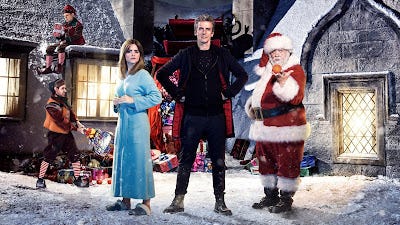
“There’s a horror movie called Alien? That’s really offensive. No wonder everyone keeps invading you.”
“Last Christmas” is an episode I want to like so much more than I actually do. In the plus column, you have Nick Frost as Santa Clause, which is just as wonderful as you’d expect, and the episode’s closing scenes are thrilling and poignant and lovely in all sorts of ways. But the minus column is quite a bit bigger for me on this one, as it feels like one of Moffat’s sloppier scripts overall, an uninspired Inception riff that spends way too much time on exposition about dream states and thinks its central conceit is far cleverer than it actually is. The episode also feels unsure how exactly to approach the Doctor/Clara dynamic, and while this is understandable from a real-world perspective – Jenna Coleman was waffling on whether or not to return for Series 9, and the script was changed last-minute when she decided to stay on – nothing here feels like a perfectly clean transition from what the characters experienced in Series 8 to where they are in Series 9. The scene near the end with the Doctor encountering an elderly Clara, while charming and well played, feels like a very awkward vestige of a script assuming this would be Coleman’s final hour. Thankfully, though, she stayed around to help fuel the show’s best modern season, and “Last Christmas” would prove to be little more than a speed-bump, the weakest of Moffat’s Twelfth Doctor scripts and an obvious qualitative outlier from an otherwise stellar period.
35. The Beast Below
Eleventh Doctor, Series 5; Directed by Andrew Gunn
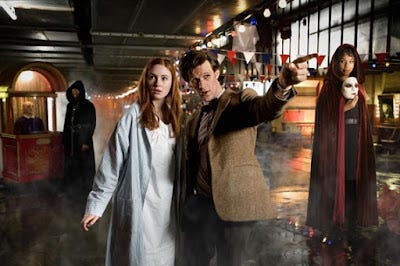
“What if you were really old, and really kind and lonely, your whole race dead. What couldn’t you do then? If you were that old, and that kind, and the very last of your kind, you couldn’t just stand there and watch children cry.”
The second episode of Moffat’s long tenure would also prove to be one of its more forgettable footnotes, a serviceable but uninspired story that does little we haven’t seen before, usually done better. ‘Uncovering a mystery in space’ is one of Doctor Who’s most reliable narrative frameworks, and one Moffat typically excels at, but I think he lays the mystery on a bit too thick here, the hour moving through clues, revelations, big questions, and reality-changing answers too fast for anything to really stick. It has some good production design, some beautiful music from Murray Gold, a fun guest character in ‘Liz 10,’ and typically excellent performances from Matt Smith and Karen Gillan, but the script itself feels noticeably less interesting or fresh than Moffat’s other (outstanding) work from Series 5, a batch of episodes so good they doom this one to obscurity by comparison.
34. The Angels Take Manhattan
Original Written Review / Original Podcast Review
Eleventh Doctor, Series 7; Directed by Nick Hurran
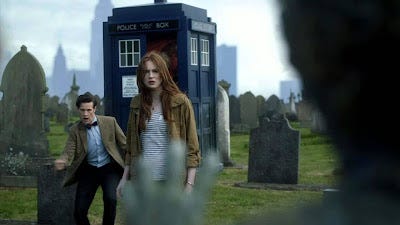
“Raggedy man. Goodbye.”
Oh “The Angels Take Manhattan.” What am I to do with you? Here is an episode that excels so strongly in so many ways, and fails so resoundingly in so many others, that even after five years and at least that many viewings, I still don’t quite know what to make of Amy and Rory’s curtain call. Amy’s farewell scene is, in and of itself, spectacularly mounted, a breathtaking blend of character writing, performance, direction, and music, all of which work in harmony to make the Doctor’s anguished reaction feel truly palpable. And yet, I do not for a second buy any of the plot mechanics that get us to that graveyard and to Amy’s final decision, as every narrative step is rooted in Moffat’s worst, most nonsensical ‘timey-wimey’ impulses. If the whole tragedy hinges on the TARDIS being unable to travel back to New York because of the paradoxes, why can’t the Doctor just take the TARDIS to New Jersey, hop in Bessie, and drive over the state line to pick up Amy and Rory and bring them back? The events of the hour depend on us trusting that the rules made up seemingly on the fly over the course of the hour are real and ironclad, and that’s just not good enough, especially if you’re using those made-up time travel rules as means to bid farewell to two main characters.
It doesn’t help that Amy and Rory had far overstayed their welcome at this point in the series, that Moffat ventures back to the ‘Rory dies again’ well for approximately the 344th time in just over two seasons, that he had seemingly run out of new and interesting things to do with River Song, or that the production team was clearly struggling to find new ways to make the Angels scary. For an enemy that relies so heavily on minimalism, three stories was probably one too much, and in trying to split the difference between the quiet horror of “Blink” and the bombast of the “Time of Angels/Flesh and Stone” 2-parter, “Angels Take Manhattan” ultimately comes up short. It’s an episode that says goodbye to an era that had gone on too long to begin with by building a story out of tired, repetitive elements, and for every moment that works because of direction or performance, there’s another that simply feels frustrating.
And yet…you get to that final scene at the graveyard, and you see Matt Smith and Karen Gillan exchange their final acting duet, and you hear Murray Gold scoring the absolute hell out of the moment, and no matter how many problems the story might have, you cannot write it off entirely. In the end, by the skin of its teeth, “Angels Take Manhattan” works – not perfectly, not completely, and not without significant gaps (Rory is zapped away mid-line with no denouement), but well enough to make you feel the requisite impact. And that has to count for something.
33. Asylum of the Daleks
Original Written Review / Original Podcast Review
Eleventh Doctor, Series 7; Directed by Nick Hurran
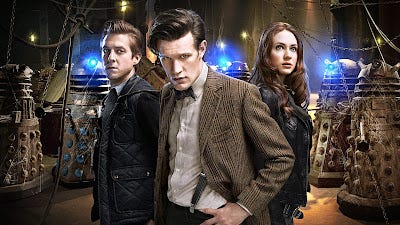
“Who killed all the Daleks?”
“Who do you think?”
“Asylum of the Daleks” is definitely one of the better Dalek stories in modern Who, which, given the track record, doesn’t necessarily equate to being a ‘great’ episode. But this is still a very good one, with a clever concept and an excellent sense of pace and style. Like much of Series 7’s first batch of episodes, “Asylum” is held back by Amy and Rory fatigue – here, they have to almost get divorced and, yet again, rediscover their undying love – but this one at least gets a big dash of energy from Jenna Coleman’s Doctor Who debut, playing a Clara-esque character who really isn’t Clara at all. The hour makes truly excellent use of the Daleks themselves, with each of the ones the Doctor and friends encounter being broken or insane. Rory’s encounter with a Dalek who seemingly keeps asking for “eggs,” only for us to slowly realize it’s trying to say “exterminate,” is one of the more effectively chilling and surprising Dalek moments I’ve ever seen. A few points taken off for the sheer barrage of “Doctor WHO?!?” puns in the last five minutes, but otherwise a more than solid addition to the ever-growing Dalek canon.
32. The Bells of St. John
Eleventh Doctor, Series 7; Directed by Colm McCarthy
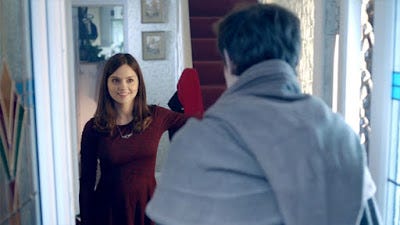
“Suppose there was something living in the Wi-Fi, harvesting human minds, extracting them. Imagine that. Human souls trapped like flies in the World Wide Web, stuck for ever, crying out for help.”
“Isn’t that basically Twitter?”
“The Bells of St. John” isn’t a great episode of Doctor Who, but it was a much-needed injection of energy at a time when the show had started to feel fairly stagnant. After two fake-outs, we are finally introduced to the real Clara Oswald, and while the character we meet here isn’t quite the wonderful, three-dimensional figure she would become over the course of her three seasons on the show, Jenna Coleman is great enough to make even her third ‘first impression’ a winning one, and her chemistry with Matt Smith – who gets to start adding a lot of new, interesting shading to his performance with a new companion to play opposite – is a lot of fun here. The scene when she wakes up to find the Doctor waiting outside, guarding the house – “I invented the quadricycle!” is one of the funniest Matt Smith line readings – is just a lovely character moment for both of them. Moffat’s script is well-paced and energetic, with lots of great moments of action and character interaction, even if the central threat about evil WiFi mostly sounds like an old man yelling at clouds (though the Twitter joke quoted above is quite good). On the whole, I’m not sure if this is a manifestly better episode than the Series 7A installments listed below, but the new status quo it establishes makes it feel a lot more fresh and invigorating, and the hour never fails to leave a smile on my face.
31. Time Heist
(written with Stephen Thompson)
Twelfth Doctor, Series 8; Directed by Douglas Mackinnon
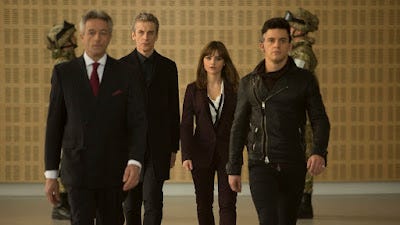
“Listen – when we’re done here, by all means, you go and find yourself a shoulder to cry on. You’ll probably need that. ‘Til then, what you need is me.”
“Time Heist” feels like a typical high-concept Eleventh or Tenth Doctor escapade filtered through the darker, more grounded personality and worldview of the Twelfth, and the way the episode leverages that sense of expectation is part of what makes it a very compelling one-off. There are plenty of moments where you can imagine Matt Smith or David Tennant doing the same things or saying the same lines, followed up by an unexpectedly dark or ruthless flourish that underlines just how wonderfully different Peter Capaldi feels in the role. The way Twelve talks others through their deaths in the face of the monstrous Teller is particularly impactful, and the character writing with him and Clara throughout feels astoundingly on point (the opening sequence, with a bored and lonely Doctor annoying Clara into coming on an adventure with him, is superb). The ‘twist’ ending is a bit labored in its execution, but I like the ultimate reveal and outcome, and the Teller makes for a memorably formidable antagonist. As with all of the ‘co-written’ episodes, it’s impossible to pinpoint Moffat’s exact contributions, but you can feel his fingerprints all over the story (especially in the character writing), and given that Stephen Thompson wrote the two worst episodes of Matt Smith’s run (“Curse of the Black Spot” and “Journey to the Centre of the TARDIS”), I’m inclined to think Moffat did more than just polish this one.
Come back tomorrow for Part 2, with #30 - #21, as we continue our journey through all 40 Steven Moffat Doctor Who stories!
Follow author Jonathan Lack on Twitter.

